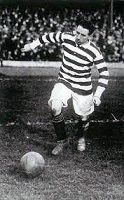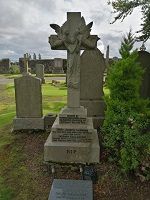Patsy Gallacher

Few players could be closer to being Scots without allowance to be so for international footballing purposes than Patrick "Patsy" Gallacher. And by that I mean not the one born in Bridge of Weir in 1909 and winning a single cap, ironically against Ireland. No. This is the "Mighty Atom", the one brought up in Clydebank, again somewhat ironically on John Knox St., from sixth months, perhaps three years, old but born in 1891 in Milford, Baile Na nGalloglagh, Gallacher Town, in far north of Donegal, from where on a good day the hills of Islay or Tiree might almost dot the horizon. It meant that whilst he played over 550 Scottish League games, two of his sons, Tommy and Willie, two grandsons, Brian and Kevin, Kevin even winning some Scotland fifty-three caps, his nephew and great nephew, both John, were all professional footballers, and his great-grand-daughter now being one, for him representing Scotland officially was denied. Although international representation did come his way it was only on twelve occasions, eleven for the Irish Football Association, six agin' Scotland, and a final one, aged forty-one, for the Free State.
Patsy Gallacher was born Irish and literally in the poor-house, the youngest boy of six siblings. He was at his greatest 5ft 7ins tall and built like the waif he might otherwise have been. Yet, in spite of the interruption to football of the Great War, he was arguably the best right-sided inside-forward Scottish football has ever produced and at a time when his was perhaps for the moment the one position where there was a dearth of competition. Imagine a forward-line with Alex Jackson outside him, Alan Morton on the other wing, Patsy's Rangers friend Andy Cunningham inside Morton and his name-sake, Hughie, leading the line.
And it was, in spite in his thirties and early forties a century and half of appearances for Falkirk after a short interlude in the United States, at Celtic that Gallacher made his reputation with some four hundred and thirty league games, four hundred and ninety-one in all, in fourteen season less four for the War with one hundred and eighty-six goals, one every two and a third matches. But even that had not been without its problems. His primary school had an all-female teaching staff. He had had to organise its team. And then there was his physique. He was puny, frail-looking but his potential was enough to get him trials at Clyde and Celtic. and that was it. He would join the Parkhead club and make his senior debut in October 1911, aged twenty, revitalising an aging team and winning a Scottish Cup medal at the end of that first season. It was to be the first of four Cups and six League titles and it was in his last Cup he scored perhaps his most famous goal of many, somersaulting over the line with the ball held between his feet.
However, that Cup Final was to his last. Having just turned thirty-four and by some distance the best-paid player at the club, Celtic and Willie Maley decided to retire him. He didn't want to go and without him in the team Celtic began a decline, albeit a slow one. The Cup was lost the following year, won the next and lost again the next. The League was won the following season but lost repeatedly after that. Meanwhile now with Falkirk Patsy played on at the top flight for another half a dozen years. Perhaps he might have even played on longer still but he lost his wife, Mary, in 1929 in childbirth, they had married in 1915, and now had six children to bring up. He never remarried. So, having worked like his father in the shipyards in his youth and during the Great War, then in the pub-trade, he continued, as he had since 1925, running the International Bar back in Clydebank until his death in June 1953 somewhat paradoxically in Scotstoun and at the age of just 62. His funeral mass was held at St Paul’s at neighbouring Whiteinch but he was and is buried with his wife in Arkleston Cemetery between Renfrew, where she had lived and one of their children was born, and Paisley.

Birth Locator:
Residence Locations:
1891 and 1911 - 11 and 32, John Knox St. Clydebank
1929 - 50, Lennox Ave., Scotstoun, Glasgow
Grave Locator:
Back to the Irish Trail,
to the Cart Trail No.4, Johnstone and Paisley
or the SFHG Home page